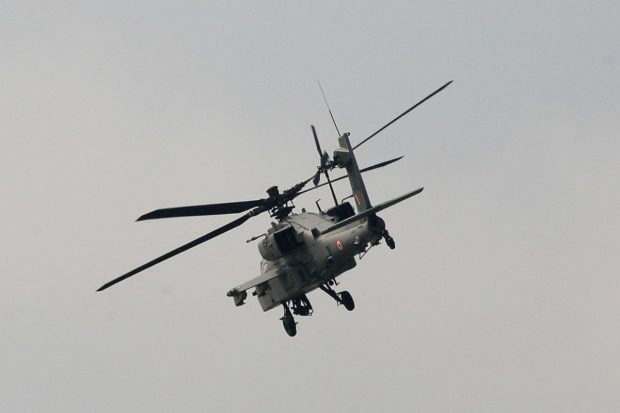
IAF team fits indigenous airborne locust control system on Mi-17 helicopters
Team Udayavani, Jul 1, 2020, 7:34 AM IST

New Delhi: The Indian Air Force has indigenously modified two Mi-17 helicopters for atomised airborne spraying of pesticide to deal with locust attack, according to a statement issued by the IAF on Tuesday.
Using all indigenous components, the atomised airborne spraying of pesticide has been successfully achieved in air through a configuration of nozzles mounted both sides on external trusses of a Mi-17 helicopters, the statement added.
The nozzles used for the purpose are a mix of commercially available as well as the ones developed by the Central Scientific Instruments Organisation (CSIO), Chandigarh.
The pesticide malathion in appropriate concentration would be filled in the internal auxiliary tank of 800 litres capacity fitted inside the helicopter and pumped into the nozzles by using an electrical pump as well as compressed air, achieving nearly 40 minutes of spaying duration in the infected zone covering an area of approximately 750 hectares in each mission.
A team of test pilots and test engineers of aircraft and Systems Testing Establishment, Bangalore have successfully carried out ground and airborne trials of Airborne Locust Control System (ALCS) on a modified Mi-17 helicopter.
The system is being offered for use with malathion for deployment in the locust control operation.
Being an indigenously developed system, ALCS would offer inherent advantages of in-house maintenance, future upgradeability, saving of foreign exchange and help in making the country self-reliant in aviation-related technology.
Initially, anticipating locust attack, the Ministry of Agriculture signed a contract with M/s Micron, UK to modify two Mi-17 Helicopters for spraying atomised pesticide to arrest locust breeding in May.
However, due to the COVID-19 pandemic, the UK-based firm would be able to manufacture and supply the modification kit to the IAF only from September onwards for system integration and testing, the statement added.
Meanwhile, an unprecedented locust attack started manifesting from May last week and was fast spreading practically across many states.
“In view of envisaged delay in provisioning of modification kits by M/s Micron, the Indian Air Force tasked No. 3 Base Repair Depot located at Chandigarh to undertake the challenging task of indigenously designing and developing an airborne Locust Control System (ALCS) for Mi-17 helicopters,” the statement added.
Udayavani is now on Telegram. Click here to join our channel and stay updated with the latest news.
Top News

Related Articles More

One dead, 20 rescued after tourist boat capsizes off Calangute beach in Goa

Anna University girl student ‘sexually assaulted’, Biryani seller held

Man hacked to death for opposing drug abuse in Kerala

Three fake policemen arrested for extorting money through honey trap in Delhi

U’khand: 3 killed, 24 injured as bus falls into gorge in Bhimtal
MUST WATCH
Latest Additions
Thanks for visiting Udayavani
You seem to have an Ad Blocker on.
To continue reading, please turn it off or whitelist Udayavani.
























